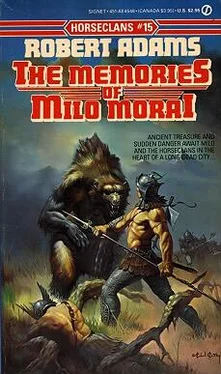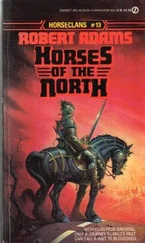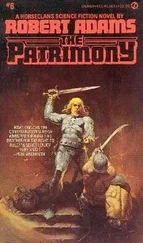The ancient council table and all the chairs had been moved to the ground floor of the armory and the entire contents of the library—shelves, books, tables, everything—to the second floor. The fine, spacious, high-ceilinged chambers thus emptied had almost immediately been filled with bags and baskets of grains—wheat, barley, oats and shelled corn—the beams all festooned with strings of dried squashes, gourds, garlic, peppers, onions and herbs. A brace of young ferrets had been installed to keep out rats and mice, and Mosix had been charged with feeding the beasts.
The old man also was given permission to take limited quantities of whichever grain suited his fancy from the common stores, and one of the farm wives showed him how to quern grain into flour, then make it into dough and bread, but he usually was far too tired to go through so lengthy a process at the end of a day’s work, so he most often merely cracked the grain, then boiled it to porridge along with a bit of his steadily shrinking larder of smoked or dried or salted meats.
Twice each week, the deposed priest could ride his ass to the vicinity of the armory and there be allotted fresh meat, generally wild game—squirrel, rabbit, raccoon, wild pig, venison of various sorts, greasy opossum.
Then, of a day, he rode into the cleared area to see one very large and two smaller bearskins stretched on racks before the armory; the two smaller ones were both black, but the larger was of a striking shade of honey-brown.
As he sliced off a couple of pounds of meat from a ham of the fly-crawling larger carcass—both of the smaller having long since become only bare bones—the stripling in charge of apportioning the biweekly flesh willingly told Mosix of the source of so much rich provender.
“It ’uz the cap’n. Him and a bunch of the men trailed back a bear what had kilt a nanny goat out to Fraley’s place. Trailed right back into the town, too, she did. They follered and kilt her and both her near-growed cubs. Kilt ’em right smack dab in the town!” The stripling then stood grinning, obviously expecting an angry denunciation of the captain’s sacrilegious actions.
But he was disappointed. Mosix only accepted his bloody meat, remounted his ass and began the ride back, kept quiet not by self-control but by absolute shock. True, Wahrn Mehrdok had said that he intended to lead hunters into the Sacred Precincts in pursuit of the two different cats and the bear that had been preying upon stock, but in his heart of hearts, Mosix had never really believed that die man would truly do it. No good would come of such terrible sin, he knew, but no one listened to him anymore, so there was nothing that he could do.
In the new council room on the ground floor of the armory, a dozen Guardians sat ranged about the old, old table, their captain at his accustomed place. They were passing around and scrutinizing an alien some-thing found by the party of hunters that had earlier bagged the three bears. The something was a black-shafted arrow, fletched with what appeared to be owl feathers, nocked with antler horn, wound with very fine sinew and shod with a wickedly barbed, razor-edged, needle-pointed head of bright brass. It had been found in a marshy area just north of the place where the bears had been found and slain, half its length buried at a very shallow angle in the peat.
“This ain’t a crossbow bolt,” stated the first sergeant, adding, “But it’s way too short to be a arrer from a straight bow, lest it was a youngun’s bow. And who’d give a youngun arrers with brand-spankin’-new brass heads?”
The captain nodded. “I’ve seen arrows very much like this one a long time ago, way up north, when I was a hired sword for a caravan of eastern traders. Those were shod with iron or steel, but the heads had similar shape and barbing to this one. Those who carried them and the short, very powerful bows that sped them were mercenaries, like me, all come of different clans of a far-flung confederation of nomads and the finest horsemen I’ve ever seen, bar none, not to mention their splendid archery and other warlike skills. If a clan of that stripe has drifted down here, we had best make friends with them, and that quickly, too, for such as they could likely butcher the lot of us before breakfast.”
He raised a horny hand to quell the rising rumble and said, “Now just hold on, all of you. How many of you have ever fought another man to the death? I have and so has the first sergeant, but we two are all, the rest of you are farmers and hunters, nothing more. Most of you are pretty good with your hunting crossbows and prods, a few of you indicate promise of developing into reasonably fair swordsmen, granted time and intensive practice, but none of those two paltry skills would be enough were you faced with men who had virtually cut their teeth on their swords and axes and lances, had learned the tricky art of loosing a bow accurately from the back of a galloping horse before they’d seen twelve winters.
“Gentlemen, I learned a long time ago that if a man is too strong to be fought with any chance of winning, best to make him your friend, and the sooner the better. Besides, we’ve been talking for the last few years about eventually leaving here, becoming nomad herdsmen and hunters ourselves. Who better to teach us all the things we’ll need to know, eh?
“First Sergeant and I are going to ride out tomorrow and see if we can find the camp of these nomads. Sergeant Djahnstuhn will be in command until we return. Questions?”
But finding the nomad camp did not prove to be either quick or easy. Because the alien arrow had been found in the northeastern sector of the ruins, Captain Mehrdok led his companion first to the area north and east of the shrinking lake, vainly, not getting back to the armory until well after moonrise.
At around noon of the second day, at a spot well north of the lake, Mehrdok reined up, saying, “They wouldn’t be this far from water, Kahl, so they must be on the west side of the lake, either that or somewhere down along the creek. Let’s turn around and go back home today and search the west bank tomorrow.”
They had riddenalong, retracing their path toward the southeast, for some miles, and the shimmer of the lake was once more in sight when Mehrdok spoke again. Quickly, tensely, in a low tone, he cautioned his companion, “Kahl, listen tight! Keep both your hands on your reins and in full view. Whatever you do, do not make any move in the directions of your crossbow, your spear or your knives. There’re riders close behind us, on both sides of us and probably in front of us, as well. Don’t speed up the pace, either.”
First Sergeant Rehnee gulped once, then asked in a half-whisper, “Then what do we do, Wahrn?”
“Nothing except keep riding at a steady clip, Kahl,” was the reply. “This is their barn dance, whoever they are—they’ll call the steps.”
Rehnee could see only a little way into the thick stands of tall grasses through which they were riding and could not imagine how his captain had been able to see farther, but there could be no mistaking the intensity of Mehrdok’s voice. Somehow, the man had truly sensed danger . . . deadly danger.
Little Djahn Staiklee and his hunt had once again spent the morning and the early part of the afternoon in the rich hunting and fishing area of the swampy onetime suburbs of the ruined town. On their return to camp, they swung for no particular reason a little to the east of their usual route. It was for that reason that they cut across the clear trail of two shod horses, headed north. Curious and more than a little suspicious of possible designs against the camp on the other side of the lake, Little Djahn had Djim-Bahb Gahdfree, most accomplished tracker of them all, distribute his load of game, to two others, then set off on the trail at a fast pace, while the rest of the party followed more slowly.
Читать дальше












